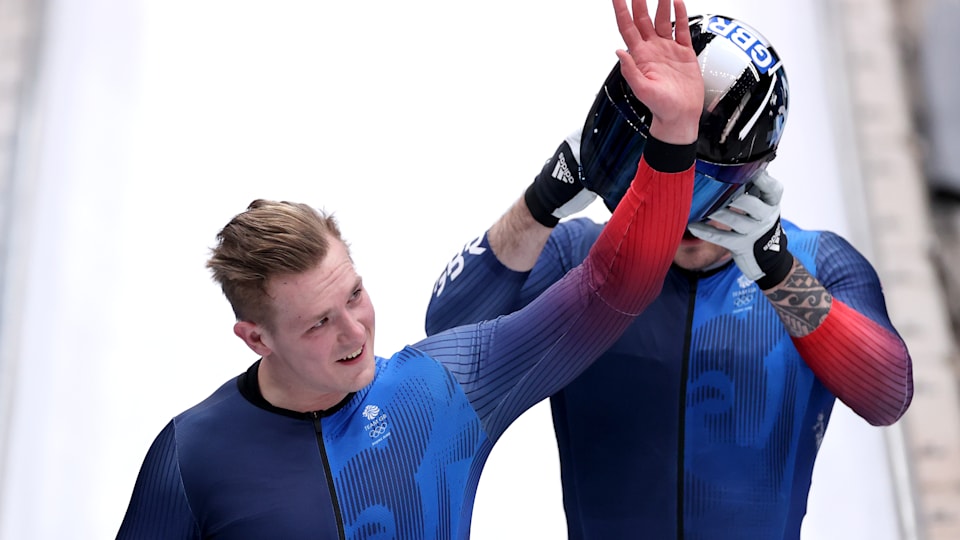The training techniques that took Brad Hall from also-ran to bobsleigh World Championship favourite
Great Britain's four-man squad, led by Brad Hall, have a chance to claim a first-ever world title to accompany their European version won just last month, beating legendary German pilot Francesco Friedrich and team on home ice to do it. So how did GB become world contenders?

Prior to 2016, Brad Hall had accepted he would “never be a world-class athlete”. By February 2023, the British bobsleigh athlete and his crew have been taking on – and beating – the ‘invincible’ Germans, with a potential world championship title on the cards come Sunday (5 February). So how did they get here?
Hall’s results at the 2016 World Championship in Innsbruck , Austria, were 17th in the two-man and 11th in the four-man. Was that it, he thought? For a nation with limited funding and facilities, was there any way to progress even into the top 10?
Control the controllables, that’s the athlete mantra, so Hall did just that. He focused on himself.
“I changed up my training a lot,” Hall revealed on an Instagram post in July 2022, “and my programme was drastically different to the other athletes in my team.”
Hall focused on the elements he deemed most important for his role as pilot – strength, speed and power – and by a process of trial and error, worked out the best exercises to enhance those aspects of his sport.
His social media feed was soon populated with rigorous training exercises but Hall’s posts had a point beyond flexing – they detailed his progression.
Training posts include improvising weight-pulling contraptions, bungee-resisted step-ups while holding 50kg weights, and jump-bouncing hurdles while donning a weight belt.
Father figure
Patience paid off and after achieving personal best results week on week in the gym, Hall finished that summer’s training by breaking the push-track record in the UK.
Highs and lows followed. The 2017 worlds in Königssee, Germany saw a 28th-place finish in the two-man followed by a DNF after crashing on the second run in the four-man. A year later, at the PyeongChang 2018 Olympic Winter Games, however, Hall and his team-mates finished 12th and 17th, respectively in the two- and four-man disciplines, showing progression was coming. It was not just down to the new training regime, more personal influences made their impact, too.
“I can finally announce my Team GB selection for the 2018 Winter Olympic Games in Pyeongchang!!!” trumpeted a proud Hall on social media weeks prior to the Republic of Korea-hosted Games. He thanked family and friends before a special mention to his biggest source of inspiration – “my dad who is no longer with us but continues to be a huge source of inspiration to me in sport and in life. I couldn’t have done it without you pops, this one’s for you!”
Hall’s father, Stuart Hall, died of pancreatic cancer in 2014, nine months after being diagnosed, but his advice resonates with his son to this day. “He encouraged me to be the best I could be,” said Hall in a 2020 fundraising post for Pancreatic Cancer UK, “and if something was worth doing it was worth doing properly.” Words that stuck with Hall and contributed to his trajectory to the higher echelons in the sport in which he was about to start making history for himself, his team-mates and his nation.
Breakthrough
In January 2020, Hall claimed Great Britain's first two-man World Cup medal for more than 30 years bagging silver alongside Greg Cackett in Igls, Austria. The following season, Hall snagged a stunning seven podiums, starting with two-man silver at the Olympic Test event in Beijing in October before securing a further five silvers and one bronze across the 2021/22 World Cup campaign.
Hall represented Team GB for a second time at Beijing 2022 again citing his father’s influence: “I continue to compete in his honour putting to use the lessons he taught me to try and reach the Olympic podium at the Winter Olympics in Beijing 2022.”
It was not to be this time around, with 11th- and sixth-place finishes, in two- and four-man, respectively, but it wouldn’t be long before the big table-topping breakthrough.
World title looming for Brad Hall and his merry men?
The 2022/23 season has seen the squad reach stratospheric heights. A first World Cup win was followed by two more. Then, the history-making four-man team including Taylor Lawrence, Cackett and Arran Gulliver became Great Britain's first-ever European bobsleigh champions, beating legendary Francesco Friedrich’s quartet on home ice, the first time the German’s had lost in Altenberg in 17 years.
With eight podium finishes across both disciplines for Hall this season, the clamour for a potential world title is clear, as is Hall's reason for the change in form.
“I achieved a level of performance I didn’t believe possible by trying something different and it paid off. I’m now one of the fastest pushing athletes in the world and my programming and my attention to detail got me there.”
Bobsleigh World Championship four-man schedule and how to watch
Saturday 4 February (Times CET)
09:00 - Two-woman run 3 & 4
13:00 - Four-man run 1 & 2
Sunday 5 February
13:00 - Four-man run 3 & 4
You can catch updates online on the IBSF YouTube and Facebook pages.
For more information, check out the IBSF website.
